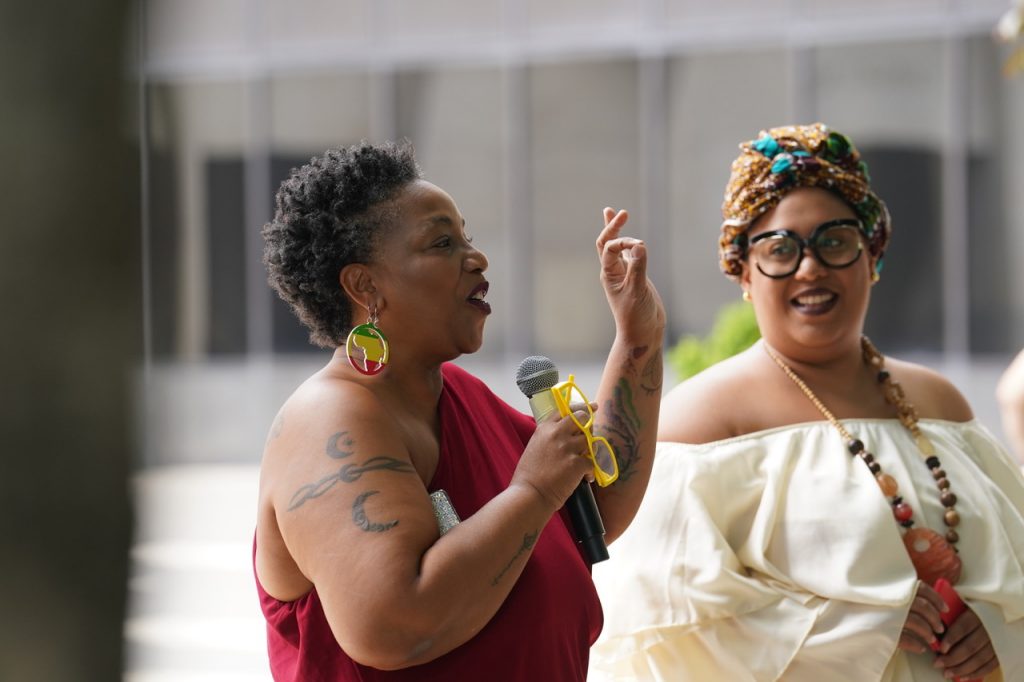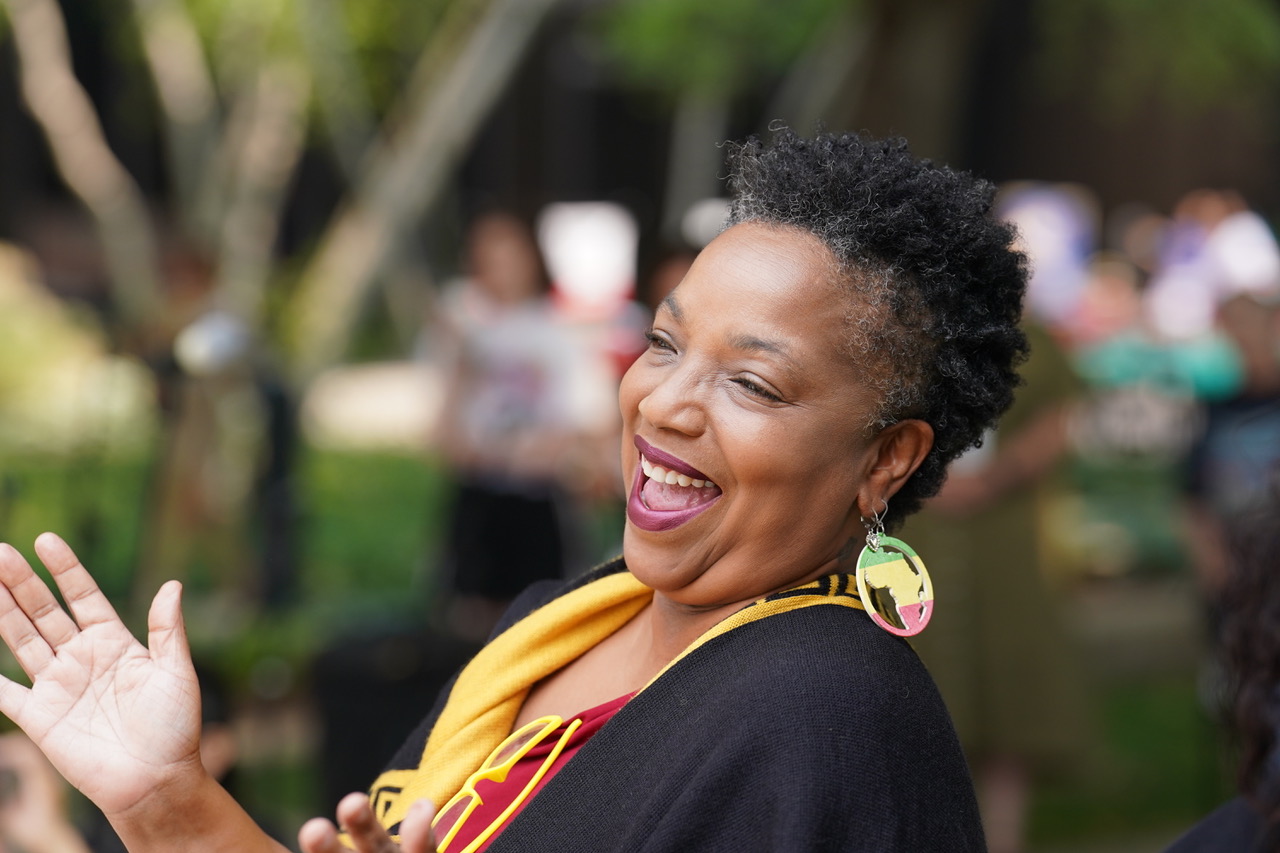Yolanda Arroyo Pizarro at LatinoLEAD’s ‘AfroLatinidad’. Saturday, July 15th, 2023. 📸 LatinoLEAD
by Isabella Silva-Biotti
From an early age, Yolanda learned that “pelo bueno” (good hair) was straight hair. Since Kindergarten, every two months, Yolanda would sit at what seemed the finest seat in the house: a stack of boxes. She was too young, too short, to reach her bi-monthly stylist who was tasked with relaxing her hair. Yet, Yolanda remembers the chemicals they’d put on her scalp.
It seemed that if her hair obeyed, the chemicals worked.
When it didn’t, her skull would break into hives and burns. Her mother and grandma performed the same tasks, so they insisted that she went along. Growing up, Yolanda would tell herself that she had “pelo malo” (bad hair), a common term used in Puerto Rico, and other Latin American countries, to refer to her afro-texture and curly hair.
It wasn’t until her freshman year of college, when a professor stopped her mid sentence to tell her that she had mishandled her hair’s selfhood all along.
Today, Yolanda Arroyo Pizarro is a Puerto rican writer who has published books on Afroidentity and sexual diversity. She is a novelist, an essayist, an activist, and currently a professor at the EDP University of Puerto Rico. Last Saturday, July 15th, she spoke at LatinoLEAD’s event AfroLatinidad at the Minneapolis Institute of Art (MIA) about her new book “Pelo Bueno“, a story about abuela Petronilla and her granddaughter, who she teaches the importance of defending her natural hair.
“Our hairs have been politicized, tortured, massacred, oppressed – to look like who?” Arroyo Pizarro said. From the dawn of time, people of African descent had their hair tyrannized. Arroyo Pizarro explained how the wives of colonizers in Puerto Rico (and other areas of the U.S. and Latin America) detested black women’s hair. They were seen as witches, seducers, or “husband-stealers”, so they requested their hair be covered. And they did. Then, black women began to decorate their turbans with flowers, seeds, and whatnots until, again, the turbans were now witchcraft.
To appear ‘white’ has become ingrained in Puerto Rican society, as other Latin American countries. The media is their worst enemy as it portrays the reality of the false “majority”. Everybody wants to look like Barbie or Ken, Arroyo Pizarro expresses. Yet, many forget where they came from and how their people have been brainwashed to desire an uncanny identity.
In her short story ‘Los Niños Morados’ (‘Bruises’, 2019), from her book TRANScaribeñx, Ricardo tells Elena “I liked you more when you looked like a boy. You saw yourself as someone braver.” A story that not only touches upon the trans experience but also the non-binary experience. The importance of remaining strong in situations where we remain the most vulnerable. Elena’s vulnerability, as much as the violence Ricardo suffers from (due to his homosexuality), expresses how the masculinities of that time didn’t allow for someone to be “weak” – and they barely do today.
“I tried to explore what we are and why we are the way we are,” Arroyo Pizarro says. “We are in the binary, and we are all breaking the binary.” Women have been pioneers in transforming identity in the Spanish language through inclusive language. To be defined under the single existing word, to a masculine and feminine version of the word, to the introduction of the pronoun “elle” (they/them) in the Spanish language.
Arroyo Pizarro’s exploration in ‘Bruises’ asks how one group can take the first steps towards falling in love while the other can’t; to ask ourselves: who gets to decide and how do they decide. In some parts of Puerto Rico, where queer safe spaces are held, the organizers wonder why the Afro-Puerto Rican communities don’t flood their rooms. Their absence is believed to stem from their unwillingness to show, but that’s not the case.
“The space has the responsibility, and so does the group,” Arroyo Pizarro says. Although there is a large lack of understanding of what racism, inaccessibility, and inequity means, the writer views the patriarchal system as the deepest cut in Puerto Rican society.
The prevailing minority, holding power at the apex of the socio-economic ladder, under the patriarchy’s influence, keeps control over other groups who may not be considered minorities. Those in charge decide how and when we come together as communities, while one group continues to bear the brunt of disadvantages and unfair treatment.
Within the frameworks led by social hypnosis, anti-racist, feminist, or inclusive movements are born. A mind game of some sorts, where “they are winning” by making large communities believe they are the “minorities”.
The people who recognize the oppressions of the patriarchy, in the meantime, are using our consciousness against us. The waves of anti-wokeness (discussed in edition 262), for example, are used now as an insult. As if being conscious of despotic politics were a crime.
Whilst groups of individuals support oppressive systems and erode rights, they hide friends and family who embody the identities that they are publicly ashamed of. On the one hand, we experience the popular critique of “minorities”. On the other, we re-group to discuss whether “racism” and other forms of injustice truly exist and where to tackle them, Arroyo Pizarro explains – when we already know it does exist.

Writers such as Yolanda stand as mirrors reflecting the essence of our contemporary world, their creative vessels pouring words, phrases, and imaginary realms into the receptive minds of those seeking to comprehend humanity’s intricate history. In Puerto Rico’s tumultuous journey, they have endured the suppression of their flag and the censorship of books, yet their resilience has prevailed, preserving their rich tapestry of history against all odds.
During her time in Minnesota, Yolanda experienced true communal healing. In group conversations with LatinoLEAD, she saw how others and herself had transformed collectively. She sees how places all over the U.S. are also having these conversations. Although the same discussions are had in Puerto Rico, Arroyo Pizarro says that her people have a different experience.
Like Yolanda, many women grow up with the experience to appear like the eurocentric ideal; light skin, straight hair, light eyes, etc. Cultures have carried the weight of the patriarchal views on race, gender, and sexuality, while many individuals struggle with defining their own identities for others to reject.
Arroyo Pizarro wishes the vanguards of the future “embrace history, and the process of the search for the genuine. Let literature always be a conversational method of critical thinking. May they allow it and allow themselves, as long as they are a reflection of what we are living in society.”
In the tapestry of our existence, woven by the threads of interconnected social categorizations, we find both walls that separate and bridges that unite. Amidst these human contradictions lies the ever-evolving essence of our non-binary nature. As we embark on the journey of self-discovery, redefining the very foundations of our identity, we become beacons of light, guiding others to uncover their own missing piece in the intricate puzzle of life.
In the choices we make, we hold the potential to spark a profound metamorphosis for the collective consciousness, paving the way towards a more compassionate and inclusive understanding of who we are as individuals and as a society.

I’m a Communication Specialist by day and celebrating my curly hair by night!
Do you enjoy reading NewPrensa?
Forward it to someone you think may enjoy it too!
Got suggestions, feedback, or a good scoop?
Send it to us at newprensa@newpublica.com
If someone sent this newsletter your way, feel free to subscribe to get local, BIPOC news



